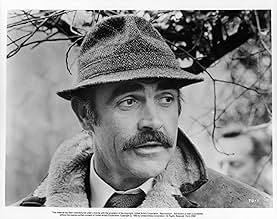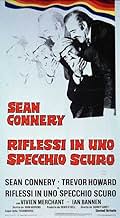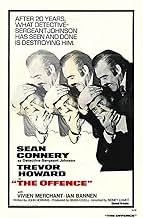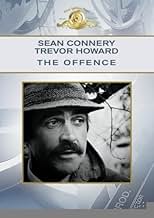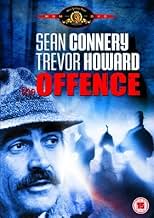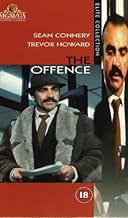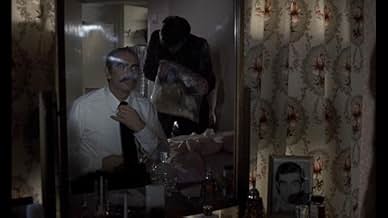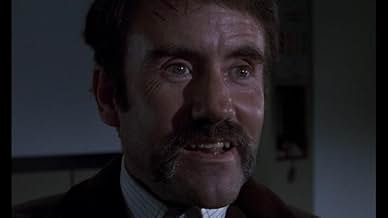PUNTUACIÓN EN IMDb
6,9/10
8,7 mil
TU PUNTUACIÓN
Un policía británico quemado cruza su límite mientras interroga a un sospechoso de abusos infantiles.Un policía británico quemado cruza su límite mientras interroga a un sospechoso de abusos infantiles.Un policía británico quemado cruza su límite mientras interroga a un sospechoso de abusos infantiles.
- Nominado a 1 premio BAFTA
- 1 nominación en total
John Cannon
- Police Constable
- (sin acreditar)
Les Conrad
- Detective
- (sin acreditar)
Timothy Craven
- Ambulance Man
- (sin acreditar)
Reseñas destacadas
A burnt-out British police detective investigates some astonishing crimes but after 20 years what Inspector-Sergeant Johnson (Sean Connery) has seen and done is destroying him. Things go wrong when eventually snaps whilst interrogating a suspected child molester called Baxter (Ian Bannen) . During the course of the interrogation takes place several surprises , twists and unexpected consequences.
Interesting and grim picture with tight editing , magnificent acting , thrills , plot twists , emotion and intense drama . It was originally conceived as a tense as well as thrilling flick about a complex interrogatory . It results to be an adaptation of a stage play titled : ¨This story of yours¨ by John Hopkings about a claustrophobic and strange duel betwen a suspicious child molester and a police officer obsessively convinced of his guilt , both of whom find themselves subtly changing places . Gripping and exciting picture about a cop who wants to investigate a grisly killing with unexpected consequences , outstanding the great Sean Connery playing very well a London detective who explodes at a police interrogation reacting against a child molester . Embedded in a realistic police procedure , thorny dialog and peculiar situations nowadays have a ring of arty melodrama ; nevertheless, riveting at times. Support cast is really excellent , such as: Trevor Howard, Vivien Merchant as starring's wife , Peter Bowles and especially Ian Bannen as prime suspect in a series of brutal attacks on young girls.
The motion picture was compellingly directed by the splendid US director Sidney Lumet , though here he failed at box-office. After starting an off-Broadway acting troupe in the late 1940s, he became the director of many television shows in the 1950s. Lumet made his feature film Adaptation of directing debut with 12 Angry Men (1957), which won the Golden Bear at the Berlin Film Festival and earned three Academy Award nominations. The courtroom drama, which takes place almost entirely in a jury room, is justly regarded as one of the most auspicious directorial debuts in film history. Lumet got the chance to direct Marlon Brando in The Figitive Kind (1960), an imperfect, but powerful adaptation of Tennessee Williams'. Sidney Lumet was a master of cinema , best known for his technical knowledge and his skill at getting first-rate performances from his actors and for shooting most of his films in his beloved New York . He made over 40 movies , often complex and emotional , but seldom overly sentimental . He achieved great successes such as ¨Serpico¨, ¨The Veredict¨, ¨Fail safe¨ , ¨ Morning after¨, ¨The hill¨ , ¨Dog day afternoon¨, ¨Murder on the Orient Express¨ , ¨Network¨ , ¨The Anderson tapes¨and his best considered one : ¨12 angry men¨ . In 2005 , Sidney Lumet received a well-deserved honorary Academy Award for his outstanding contribution to filmmaking. Rating . 6.5/10 . Above average . Well worth watching .
Interesting and grim picture with tight editing , magnificent acting , thrills , plot twists , emotion and intense drama . It was originally conceived as a tense as well as thrilling flick about a complex interrogatory . It results to be an adaptation of a stage play titled : ¨This story of yours¨ by John Hopkings about a claustrophobic and strange duel betwen a suspicious child molester and a police officer obsessively convinced of his guilt , both of whom find themselves subtly changing places . Gripping and exciting picture about a cop who wants to investigate a grisly killing with unexpected consequences , outstanding the great Sean Connery playing very well a London detective who explodes at a police interrogation reacting against a child molester . Embedded in a realistic police procedure , thorny dialog and peculiar situations nowadays have a ring of arty melodrama ; nevertheless, riveting at times. Support cast is really excellent , such as: Trevor Howard, Vivien Merchant as starring's wife , Peter Bowles and especially Ian Bannen as prime suspect in a series of brutal attacks on young girls.
The motion picture was compellingly directed by the splendid US director Sidney Lumet , though here he failed at box-office. After starting an off-Broadway acting troupe in the late 1940s, he became the director of many television shows in the 1950s. Lumet made his feature film Adaptation of directing debut with 12 Angry Men (1957), which won the Golden Bear at the Berlin Film Festival and earned three Academy Award nominations. The courtroom drama, which takes place almost entirely in a jury room, is justly regarded as one of the most auspicious directorial debuts in film history. Lumet got the chance to direct Marlon Brando in The Figitive Kind (1960), an imperfect, but powerful adaptation of Tennessee Williams'. Sidney Lumet was a master of cinema , best known for his technical knowledge and his skill at getting first-rate performances from his actors and for shooting most of his films in his beloved New York . He made over 40 movies , often complex and emotional , but seldom overly sentimental . He achieved great successes such as ¨Serpico¨, ¨The Veredict¨, ¨Fail safe¨ , ¨ Morning after¨, ¨The hill¨ , ¨Dog day afternoon¨, ¨Murder on the Orient Express¨ , ¨Network¨ , ¨The Anderson tapes¨and his best considered one : ¨12 angry men¨ . In 2005 , Sidney Lumet received a well-deserved honorary Academy Award for his outstanding contribution to filmmaking. Rating . 6.5/10 . Above average . Well worth watching .
10tully-2
This is a superb psychological thriller with a brilliant lead performance from Sean Connery.
Connery plays a police detective nearing burn-out, the fuse for which is provided by a child molester on the loose. When a suspect (Ian Bannen) is arrested, the detective takes it upon himself to interrogate the man -- and ends up beating him to death. From there, the film examines what drove the detective to do it, through individual scenes with his wife (Vivien Merchant) and the internal affairs officer investigating the beating (Trevor Howard). The final third of the film takes us step by step through the interrogation, as Bannen turns the psychological tables on Connery, making the detective see exactly the sort of animal that he has become as a result of twenty years of dealing unrelentingly with violence and death.
John Hopkins' screenplay plays very much like a stage play (it was adapted from Hopkins' play "This Story of Yours"), but in this case it works to the film's advantage as Connery's life is compartmentalized (by virtue of the scene structure) in a way that makes his personal life seem completely walled-off from his job, and his job completely walled off from the interrogation. As a result, his character's inability to deal with anything but his job (and consequently, even that) gives us marvelous clues as to why he does what he does. Sidney Lumet's direction -- his third venture with Connery (previously the two worked on two of Connery's best films: "The Hill" (1965) and "The Anderson Tapes" (1971)) -- utilizes the stagy conventions well to advance the story and to enhance the performances.
As for the performances, these are uniformly excellent. Connery has never been better, playing a character who is anything but invulnerable, instead being a bundle of nerves and frustrations which explode into violence at crucial moments. Bannen is every bit his match as a complex, manipulative character who is at the same time sympathetic (as Connery's victim) and repulsive (for the sadistic delight he takes in pushing Connery's buttons). Indeed, one of the strengths of the story is that it is never revealed whether Bannen did in fact molest the children in question -- by doing so, the film makes us understand that this is not the issue. Instead, the film is more about internal demons -- how we all have them, and how we can either control or be controlled by them.
Howard is solid in what is perhaps the least interesting role in the film, but Merchant is phenomenal as Connery's plain wife, who has withstood his emotional abuse and neglect for years, sometimes in silence, sometimes not, but always with dignity. In perhaps one of the most poignant moments in the film, Connery, half-drunk, looks up at her, and asks in wonderment, "Weren't you ever pretty?" Merchant's lines following that are less important for their text, than for her reading of them -- wounded, but still confronting her husband like a prize fighter who's determined not be knocked out by a cheap shot in the fifteenth round.
Perhaps the greatest tragedy of this film is that it is practically unknown in the United States, and that it did not air in enough American theaters to qualify for the Oscars. Otherwise, it would quite likely have resulted in Oscar nominations for Connery (in an otherwise weak year for the Best Actor category, the only comparable performance nominated was Al Pacino's in "Serpico"), Bannen, and Merchant, not to mention Hopkins and possibly Lumet. All the same, definitely a film worth seeing if you're tired of watching detective films where Bruce Willis or Mel Gibson blow away half of Los Angeles.
Rating: ****
Connery plays a police detective nearing burn-out, the fuse for which is provided by a child molester on the loose. When a suspect (Ian Bannen) is arrested, the detective takes it upon himself to interrogate the man -- and ends up beating him to death. From there, the film examines what drove the detective to do it, through individual scenes with his wife (Vivien Merchant) and the internal affairs officer investigating the beating (Trevor Howard). The final third of the film takes us step by step through the interrogation, as Bannen turns the psychological tables on Connery, making the detective see exactly the sort of animal that he has become as a result of twenty years of dealing unrelentingly with violence and death.
John Hopkins' screenplay plays very much like a stage play (it was adapted from Hopkins' play "This Story of Yours"), but in this case it works to the film's advantage as Connery's life is compartmentalized (by virtue of the scene structure) in a way that makes his personal life seem completely walled-off from his job, and his job completely walled off from the interrogation. As a result, his character's inability to deal with anything but his job (and consequently, even that) gives us marvelous clues as to why he does what he does. Sidney Lumet's direction -- his third venture with Connery (previously the two worked on two of Connery's best films: "The Hill" (1965) and "The Anderson Tapes" (1971)) -- utilizes the stagy conventions well to advance the story and to enhance the performances.
As for the performances, these are uniformly excellent. Connery has never been better, playing a character who is anything but invulnerable, instead being a bundle of nerves and frustrations which explode into violence at crucial moments. Bannen is every bit his match as a complex, manipulative character who is at the same time sympathetic (as Connery's victim) and repulsive (for the sadistic delight he takes in pushing Connery's buttons). Indeed, one of the strengths of the story is that it is never revealed whether Bannen did in fact molest the children in question -- by doing so, the film makes us understand that this is not the issue. Instead, the film is more about internal demons -- how we all have them, and how we can either control or be controlled by them.
Howard is solid in what is perhaps the least interesting role in the film, but Merchant is phenomenal as Connery's plain wife, who has withstood his emotional abuse and neglect for years, sometimes in silence, sometimes not, but always with dignity. In perhaps one of the most poignant moments in the film, Connery, half-drunk, looks up at her, and asks in wonderment, "Weren't you ever pretty?" Merchant's lines following that are less important for their text, than for her reading of them -- wounded, but still confronting her husband like a prize fighter who's determined not be knocked out by a cheap shot in the fifteenth round.
Perhaps the greatest tragedy of this film is that it is practically unknown in the United States, and that it did not air in enough American theaters to qualify for the Oscars. Otherwise, it would quite likely have resulted in Oscar nominations for Connery (in an otherwise weak year for the Best Actor category, the only comparable performance nominated was Al Pacino's in "Serpico"), Bannen, and Merchant, not to mention Hopkins and possibly Lumet. All the same, definitely a film worth seeing if you're tired of watching detective films where Bruce Willis or Mel Gibson blow away half of Los Angeles.
Rating: ****
To me "The offence" is a must. I think this film deserves to be rediscovered and reaprecciated, because it shows two giants of the cinema at their peak.
Actually the film stars Sean Connery -here in his first role after quitting the official James Bond series-, he's directed by his long time friend Sidney Lumet, one of the most talented American directors. The movie is like a theatrical piece, there's not much action. Everything stands on the actors and their expressions, the atmosphere is dark and depressing. But this is is the goal of the story. Sean is a 40 years old policeman, who faces again with a case of child abuse. He's used to deal with the most miserable stories of humanity... But this time his rage and frustrations explode: he beats a suspected person (Ian Bannen) and loses the control, he kills him. He's suspended from the service.
The movie is a psychological study of a hard man, who loses his dignity and understands too late he's a disturbed man as well. "The offence" is a small British film, a big contrast to the lavish 007 productions. We have not a hero here, we have an actor who proves once more to be a wonderful performer -here the desperation of his character is really deep.
In 1972 the movie didn't enjoy a big success, it has been revalued with the time. (maybe the story was too sad and disturbing for being a hit). Today it's considered a milestone in Connery's career. Of course it is.
Actually the film stars Sean Connery -here in his first role after quitting the official James Bond series-, he's directed by his long time friend Sidney Lumet, one of the most talented American directors. The movie is like a theatrical piece, there's not much action. Everything stands on the actors and their expressions, the atmosphere is dark and depressing. But this is is the goal of the story. Sean is a 40 years old policeman, who faces again with a case of child abuse. He's used to deal with the most miserable stories of humanity... But this time his rage and frustrations explode: he beats a suspected person (Ian Bannen) and loses the control, he kills him. He's suspended from the service.
The movie is a psychological study of a hard man, who loses his dignity and understands too late he's a disturbed man as well. "The offence" is a small British film, a big contrast to the lavish 007 productions. We have not a hero here, we have an actor who proves once more to be a wonderful performer -here the desperation of his character is really deep.
In 1972 the movie didn't enjoy a big success, it has been revalued with the time. (maybe the story was too sad and disturbing for being a hit). Today it's considered a milestone in Connery's career. Of course it is.
Sean Connery is more a superstar than an actor. Although his talents have been recognised by the Academy (for his rather unconvincing turn as an Irish cop in The Untouchables (1987)) and remembered for his role as the first James Bond, he is high up on his own pedestal, a gift for voice actors and one of the handsomest faces ever to have graced the screen. But anyone in doubt of his ability as a proper thespian need look no further than his grim, tormented portrayal of a cop who has seen one too many dead bodies in Sidney Lumet's The Offence, a huge flop at the box office and a film now faded into memory, ripe for a re-discovery.
Playing with time Rashomon (1950)-style, the film begins in slow motion, where an unknown disturbance at a police station has a few officers panicked. It is revealed to be Detective Sergeant Johnson (Connery) standing over the bloodied body of suspect Kenneth Baxter (Ian Bannen), with fellow police officers scattered on the floor. It then goes back, and we are in a grey, miserable city gripped in panic as a child-killing paedophile roams free. The latest disappearance of a young girl has Johnson riled, and officers cruising the street pick up Baxter, who is wandering alone in the night covered in mud. The young girl is found raped but alive by Johnson himself, who insists on spending some time alone with the suspect.
Based on John Hopkins' stage play This Story of Yours, Connery fought tooth-and-nail to adapt it for the big screen, eventually reprising his role as Bond in Diamond Are Forever (1971) in return for the green-light. Although the film consists of long, talky scenes, Lumet uses stylish editing in order to avoid being stagy and to delve further into his anti-hero's head. His reputation as a no- nonsense director betrays him here, as scenes of gruesome murders, body parts, and a host of other atrocities Johnson has witnessed flash before our eyes. The use of slow motion in the flashback moments also employs a sort of circular filter at the centre of the screen, reflecting Johnson's disconnection from his actions but getting slightly tiresome in the process.
There are three long, outstanding scenes. The first is Johnson returning home to his wife (Vivien Merchant) following his interrogation of Baxter, drinking heavily and exploding at the one person who could possibly help him. The second is Johnson's own interrogation with superintendent Cartwright (the ever-excellent Trevor Howard), a man who has witnessed the same level of horror himself, but has learnt to separate his work from his life, something Johnson is unable to do. The third is the extended interrogation of Baxter, where Bannen's creepy turn surely must have been an inspiration for the Joker-Batman verbal showdown in The Dark Knight (2008). It's incredibly bleak stuff, but the raw honesty of the script and performances makes this powerful stuff.
www.the-wrath-of-blog.blogspot.com
Playing with time Rashomon (1950)-style, the film begins in slow motion, where an unknown disturbance at a police station has a few officers panicked. It is revealed to be Detective Sergeant Johnson (Connery) standing over the bloodied body of suspect Kenneth Baxter (Ian Bannen), with fellow police officers scattered on the floor. It then goes back, and we are in a grey, miserable city gripped in panic as a child-killing paedophile roams free. The latest disappearance of a young girl has Johnson riled, and officers cruising the street pick up Baxter, who is wandering alone in the night covered in mud. The young girl is found raped but alive by Johnson himself, who insists on spending some time alone with the suspect.
Based on John Hopkins' stage play This Story of Yours, Connery fought tooth-and-nail to adapt it for the big screen, eventually reprising his role as Bond in Diamond Are Forever (1971) in return for the green-light. Although the film consists of long, talky scenes, Lumet uses stylish editing in order to avoid being stagy and to delve further into his anti-hero's head. His reputation as a no- nonsense director betrays him here, as scenes of gruesome murders, body parts, and a host of other atrocities Johnson has witnessed flash before our eyes. The use of slow motion in the flashback moments also employs a sort of circular filter at the centre of the screen, reflecting Johnson's disconnection from his actions but getting slightly tiresome in the process.
There are three long, outstanding scenes. The first is Johnson returning home to his wife (Vivien Merchant) following his interrogation of Baxter, drinking heavily and exploding at the one person who could possibly help him. The second is Johnson's own interrogation with superintendent Cartwright (the ever-excellent Trevor Howard), a man who has witnessed the same level of horror himself, but has learnt to separate his work from his life, something Johnson is unable to do. The third is the extended interrogation of Baxter, where Bannen's creepy turn surely must have been an inspiration for the Joker-Batman verbal showdown in The Dark Knight (2008). It's incredibly bleak stuff, but the raw honesty of the script and performances makes this powerful stuff.
www.the-wrath-of-blog.blogspot.com
What happens when a cop is finally pushed over the edge? When all the depravity he's seen throughout his decades on the force, all the sick, violent images rolling around in his head inevitably become intolerable? In this adaptation of John Hopkins play 'This Story of Yours,' you'll see, and witness one of Sean Connery's finest pieces of acting, as well another cinematic triumph from director Sidney Lumet.
Connery stars as Detective Johnson, a tough-as-nails cop investigating the rape of a young child. It's routine for him, as he specialises in the violent and the brutal. He's been doing it for twenty years and has seen everything that can be seen. However, when confronted with a strange man- masterfully played by Ian Bannen- who was picked up near the crime scene, he snaps, cascading into a tangled web of memories, violence and insanity.
Connery and Lumet first joined forces for 1965's 'The Hill', a powerful, intriguing war drama set in a North African military prison. They then reteamed in 1971 on the slick crime caper 'The Anderson Tapes.' The two evidently enjoyed a positive experience working together, and for their third collaboration decided to try something a little darker and more abstract: 'The Offence.' (They made two more films, 1974's brilliant 'Murder on the Orient Express' and 'Family Business,' in 1989; but the less said about that mis-cast, unfunny crime comedy the better).
'The Offence' is a fascinating study about the effect of violence on one's mental state, a dark police procedural and a riveting drama all at once. Anchored by a career best Connery, the film moves at a brisk pace, rapidly establishing a paranoid, seedy atmosphere of psychological malfunction. John Victor Smith's tight editing is outstanding, and under Lumet's direction brings us some very frightening, expertly cut sequences.
In a long and varied career, this may be cinematographer Gerry Fisher's finest hour. Due to his composition and framing, scenes look and feel claustrophobic (whether indoors or out), which adds to the tense atmosphere running throughout the film. He captures the growing madness of Connery's character masterfully and has an artful touch when it comes to shooting scenes of violence that is striking and understated.
Connery has never disappeared inside a character as thoroughly as he does here (with the possible exception of Daniel Dravot in John Huston's 'The Man Who Would Be King'): never once can you spot him acting. His Detective Johnson is an unbalanced, frightened, occasionally cruel man who has seen too much violence in his life to continue on as normal. Memories of murder and mayhem overwhelm him, and Connery captures the PTSD-like effects the character experiences with great sympathy, depth and understanding- it's one of his finest on-screen performances.
The supporting cast is filled with talented actors- Trevor Howard has a small but meaty role, and Vivien Merchant steals her all too brief scene as Johnson's long-suffering wife Maureen- but Ian Bannen stands apart from the pack. As an odd character who may or may not be a child molester, he is slick and seedy; like a snake-oil salesman for the devil's brew. His scenes with Connery are some of the darkest and morally vague you're ever likely to see. His performance rivals Dennis Hopper's in 'Blue Velvet' as one of cinema's most entertaining and insidious creeps.
The film goes to some very sinister places, but never becomes painful to watch. The story is handled with care and intelligence- Hopkins's screenplay is just as powerful as his original theatrical production- and has some unforgettable moments. Lumet and Connery together were a force to be reckoned with, as this obsidian-dark, clever crime drama proves. It's a fantastic, well-written and devastatingly entertaining piece of filmmaking.
Connery stars as Detective Johnson, a tough-as-nails cop investigating the rape of a young child. It's routine for him, as he specialises in the violent and the brutal. He's been doing it for twenty years and has seen everything that can be seen. However, when confronted with a strange man- masterfully played by Ian Bannen- who was picked up near the crime scene, he snaps, cascading into a tangled web of memories, violence and insanity.
Connery and Lumet first joined forces for 1965's 'The Hill', a powerful, intriguing war drama set in a North African military prison. They then reteamed in 1971 on the slick crime caper 'The Anderson Tapes.' The two evidently enjoyed a positive experience working together, and for their third collaboration decided to try something a little darker and more abstract: 'The Offence.' (They made two more films, 1974's brilliant 'Murder on the Orient Express' and 'Family Business,' in 1989; but the less said about that mis-cast, unfunny crime comedy the better).
'The Offence' is a fascinating study about the effect of violence on one's mental state, a dark police procedural and a riveting drama all at once. Anchored by a career best Connery, the film moves at a brisk pace, rapidly establishing a paranoid, seedy atmosphere of psychological malfunction. John Victor Smith's tight editing is outstanding, and under Lumet's direction brings us some very frightening, expertly cut sequences.
In a long and varied career, this may be cinematographer Gerry Fisher's finest hour. Due to his composition and framing, scenes look and feel claustrophobic (whether indoors or out), which adds to the tense atmosphere running throughout the film. He captures the growing madness of Connery's character masterfully and has an artful touch when it comes to shooting scenes of violence that is striking and understated.
Connery has never disappeared inside a character as thoroughly as he does here (with the possible exception of Daniel Dravot in John Huston's 'The Man Who Would Be King'): never once can you spot him acting. His Detective Johnson is an unbalanced, frightened, occasionally cruel man who has seen too much violence in his life to continue on as normal. Memories of murder and mayhem overwhelm him, and Connery captures the PTSD-like effects the character experiences with great sympathy, depth and understanding- it's one of his finest on-screen performances.
The supporting cast is filled with talented actors- Trevor Howard has a small but meaty role, and Vivien Merchant steals her all too brief scene as Johnson's long-suffering wife Maureen- but Ian Bannen stands apart from the pack. As an odd character who may or may not be a child molester, he is slick and seedy; like a snake-oil salesman for the devil's brew. His scenes with Connery are some of the darkest and morally vague you're ever likely to see. His performance rivals Dennis Hopper's in 'Blue Velvet' as one of cinema's most entertaining and insidious creeps.
The film goes to some very sinister places, but never becomes painful to watch. The story is handled with care and intelligence- Hopkins's screenplay is just as powerful as his original theatrical production- and has some unforgettable moments. Lumet and Connery together were a force to be reckoned with, as this obsidian-dark, clever crime drama proves. It's a fantastic, well-written and devastatingly entertaining piece of filmmaking.
¿Sabías que...?
- CuriosidadesWhen Sean Connery agreed to return as James Bond in Diamantes para la eternidad (1971), as part of his deal, United Artists had to back two movies of his choice that would cost $2 million or less. This was to be the first; a Connery-directed version of "Macbeth" was to be the second. When this movie failed at the box office and Roman Polanski beat Connery to the screen with Macbeth (1971), Connery's version of "Macbeth" was cancelled.
- PifiasA ladder leaning against the wall in the hallway outside of the police interrogation room is clearly labeled "TFS" for "Twickenham Film Studios."
- Citas
Kenneth Baxter: Nothing I have done can be one half as bad as the thoughts in your head.
- ConexionesFeatured in Big Screen: The Battle of the Bonds (1998)
Selecciones populares
Inicia sesión para calificar y añadir a tu lista para recibir recomendaciones personalizadas
- How long is The Offence?Con tecnología de Alexa
Detalles
- Fecha de lanzamiento
- Países de origen
- Idioma
- Títulos en diferentes países
- The Offence
- Localizaciones del rodaje
- The Carnival Public House, Battersea, Londres, Inglaterra, Reino Unido(pub scene: interior)
- Empresa productora
- Ver más compañías en los créditos en IMDbPro
Taquilla
- Presupuesto
- 900.000 US$ (estimación)
Contribuir a esta página
Sugerir un cambio o añadir el contenido que falta

Principal laguna de datos
By what name was La ofensa (1973) officially released in India in English?
Responde
